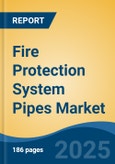Seamless Pipes is the fastest growing segment, North America is the largest market globally
Speak directly to the analyst to clarify any post sales queries you may have.
10% Free customizationThis report comes with 10% free customization, enabling you to add data that meets your specific business needs.
Key Market Drivers
The global fire protection system pipes market is significantly influenced by increasingly stringent fire safety regulations and ongoing infrastructure development. Evolving building codes worldwide necessitate enhanced fire suppression measures, directly driving the demand for specialized piping systems. These regulations often mandate the installation of comprehensive fire protection in various structures, leading to substantial adoption. For instance, according to the Regulator of Social Housing, in their February 2024 report on fire safety remediation, approximately 98% of social housing buildings 11 meters or more in height in England had undergone fire risk assessments, reflecting a high level of compliance and the sustained need for robust safety systems. Such assessments frequently identify requirements for new or upgraded piping infrastructure.Key Market Challenges
A significant challenge impeding the expansion of the Global Fire Protection System Pipes Market is the substantial initial capital investment required for comprehensive system installation, coupled with ongoing maintenance expenses. These financial outlays can act as a notable barrier, particularly for small and medium-sized enterprises or developers in cost-sensitive markets. The complexity of integrating these systems into existing infrastructure during renovation projects also contributes to elevated costs, making adoption less attractive despite the clear safety benefits.Key Market Trends
The integration of smart technologies and IoT connectivity is fundamentally transforming fire protection systems by enabling real-time monitoring, remote management, and predictive maintenance capabilities. This advanced connectivity allows for quicker detection of hazards and more efficient system response. According to the National Fire Protection Association (NFPA), a survey released in August 2025 indicated that 64% of respondents noted an improvement in workflows since implementing digital tools in skilled trades, highlighting the growing impact of advanced technology across the industry.Key Market Players Profiled:
- Johnson Controls International PLC
- TATA Steel Limited
- Simona AG
- Astral Limited
- China Lesso Group Holdings Ltd
- Mueller Industries, Inc.
- Jindal Industries Pvt. Ltd.
- Henan Keerun Trading Co., Ltd
- Minimax Viking GmbH
- Tianjin Profound Multinational Trade Co., Ltd.
Report Scope:
In this report, the Global Fire Protection System Pipes Market has been segmented into the following categories:By Type:
- Seamless Pipes
- Welded Pipes
By Material:
- Steel
- CPVC
- Copper
- Others
By End-User:
- Residential
- Industrial
- Commercial
By Region:
- North America
- Europe
- Asia Pacific
- South America
- Middle East & Africa
Competitive Landscape
Company Profiles: Detailed analysis of the major companies present in the Global Fire Protection System Pipes Market.Available Customizations:
With the given market data, the publisher offers customizations according to a company's specific needs. The following customization options are available for the report:- Detailed analysis and profiling of additional market players (up to five).
This product will be delivered within 1-3 business days.
Table of Contents
Companies Mentioned
- Johnson Controls International PLC
- TATA Steel Limited
- Simona AG
- Astral Limited
- China Lesso Group Holdings Ltd
- Mueller Industries, Inc.
- Jindal Industries Pvt. Ltd.
- Henan Keerun Trading Co., Ltd
- Minimax Viking GmbH
- Tianjin Profound Multinational Trade Co., Ltd.
Table Information
| Report Attribute | Details |
|---|---|
| No. of Pages | 186 |
| Published | November 2025 |
| Forecast Period | 2024 - 2030 |
| Estimated Market Value ( USD | $ 17.72 Billion |
| Forecasted Market Value ( USD | $ 26.74 Billion |
| Compound Annual Growth Rate | 7.1% |
| Regions Covered | Global |
| No. of Companies Mentioned | 10 |









